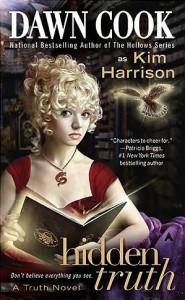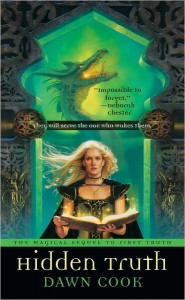
 Having been convinced that magic does, in fact, exist, and that she’s inherited no small portion of her father’s talent for it, Alissa has run into a small problem. The only place where such talents may be nurtured and explored is the mysterious Hold. In this Hold, the ancient Masters pursue inscrutable goals, while both teaching and being served by the Keepers. But the Keepers are all dead, and the Masters gone, and the Hold is ruled by the megalomaniacal, ruthless Bailic, the man who murdered Alissa’s father. He alone controls the Hold, and in doing so, he controls the key to Alissa’s destiny, the mystic tome known as the First Truth. He also holds her piper friend Strell hostage, giving her no choice but to play along with his evil schemes.
Having been convinced that magic does, in fact, exist, and that she’s inherited no small portion of her father’s talent for it, Alissa has run into a small problem. The only place where such talents may be nurtured and explored is the mysterious Hold. In this Hold, the ancient Masters pursue inscrutable goals, while both teaching and being served by the Keepers. But the Keepers are all dead, and the Masters gone, and the Hold is ruled by the megalomaniacal, ruthless Bailic, the man who murdered Alissa’s father. He alone controls the Hold, and in doing so, he controls the key to Alissa’s destiny, the mystic tome known as the First Truth. He also holds her piper friend Strell hostage, giving her no choice but to play along with his evil schemes.
This, then, is the setup for Hidden Truth, the sequel to First Truth. Strell and Alissa must maintain a deadly masquerade, hiding Alissa’s true identity and talents from Bailic while trying to steal the First Truth away from him … before Bailic can wake the dead and conquer the known world. All they have is surprise, and the last of the Masters, a being called Useless who has sworn not to harm Bailic. No problem, right?
Wrong. The dead will wake, the First Truth will be opened, and Alissa will discover far more about her true potential and her destiny than she ever imagined. And she may just lose the one thing she treasures most of all in the process.
What amazes me about Hidden Truth is how effective a novel Dawn Cook has created with such a minimal cast. On screen, we encounter a mere five characters: Bailic, Strell, Alissa, Useless, and a stranger named Lodesh. That’s all. Despite a setting that could easily encompass hundreds of people, and a threat which could endanger entire lands, Cook manages to boil things down to a mere five characters, without sacrificing urgency or scale. It feels so much bigger than it really is, with the ghosts of offscreen characters affecting the plot and movement, and never actually interacting with the main characters.
It conjures up a claustrophoic effect as well, much like The Shining, keeping the characters cooped up for the most part in the one sprawling, empty building, and suggesting the howling devils of winter’s winds outside. Until we reach the beginning of the end, there’s always a cramped, uncomfortable, somewhat paranoid feel, with trouble lurking just around the corner. Cook’s use of mood and atmosphere really shines here.
In general, Hidden Truth completes an intriguing “coming of age” fantasy, one started in First Truth. Alissa and Strell are both fascinating, three dimensional characters, and their interactions, as antagonistic as an episode of Moonlighting, are always fun to watch. I look forward to seeing more from Cook, now that she’s proven she can tell a darn good story. Read First Truth before this one, though, if you want the full experience. The pair will appeal to fantasy readers, as Cook manages to utilize traditional trappings and still tell a new story.
